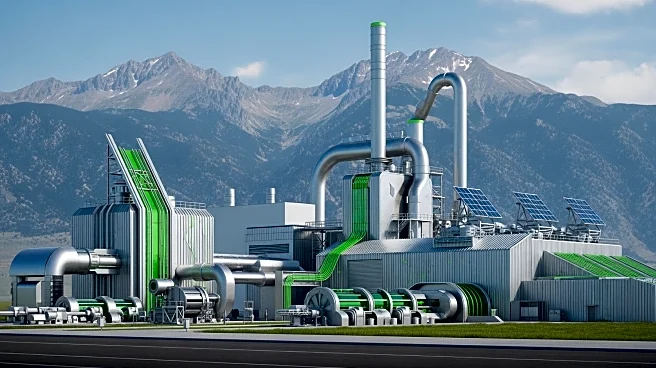What's Happening?
Electra, a startup focused on producing low-carbon iron, is set to open a demonstration facility in Jefferson County, Colorado, by mid-2026. The facility will produce 500 tons of low-carbon iron annually,
supported by a $50 million grant from Breakthrough Energy and corporate contracts with Meta, Nucor, Toyota Tsusho, and Interfer Edelstahl Group. The 130,000-square-foot facility will also benefit from an $8 million state tax credit under the Colorado Industrial Tax Credit Offering. Nucor, the largest U.S. steel producer, will purchase some of Electra's iron, while Meta will buy environmental attribute certificates related to Electra's production. Electra's process uses renewable electricity and chemistry to refine iron ore, avoiding the carbon-heavy blast furnace method.
Why It's Important?
The development of Electra's low-carbon iron facility is significant for the steel industry, which contributes nearly 8% of global emissions. By using a low-temperature process powered by renewable electricity, Electra aims to reduce the carbon footprint associated with iron production. This initiative aligns with broader industry efforts to transition to low-carbon or near-zero steel, a critical step in addressing climate change. The involvement of major corporations like Meta and Nucor highlights the growing demand for sustainable materials, particularly in sectors like automotive and data center construction. Electra's project could pave the way for more sustainable manufacturing practices and influence other companies to adopt similar technologies.
What's Next?
Electra plans to calibrate its processes and test the purity of its product at the Jefferson County site. The company is exploring applications for its iron in magnets and batteries, alongside automotive and specialty uses. As Electra continues to develop its technology, it may attract further investment and partnerships, potentially expanding its production capacity. The success of this facility could encourage other startups and established players to accelerate their efforts in producing low-carbon steel, contributing to a more sustainable industrial landscape. Additionally, Electra's progress may influence policy decisions and corporate strategies regarding emissions reduction and sustainable procurement.
Beyond the Headlines
Electra's initiative represents a shift towards more sustainable industrial practices, with potential long-term impacts on global emissions and resource management. The project underscores the importance of innovation in achieving climate goals and highlights the role of corporate partnerships in driving environmental change. As the demand for low-carbon materials grows, industries may face increased pressure to adopt cleaner technologies, potentially leading to regulatory changes and new market opportunities. Electra's approach could serve as a model for other sectors seeking to balance economic growth with environmental responsibility.









